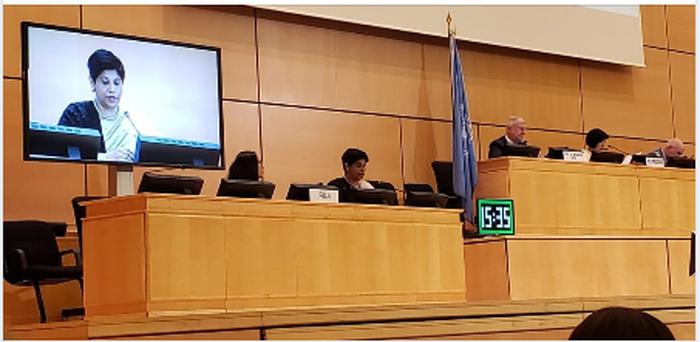"We who live in Fiji know better. We know considerable effort has gone into crafting a favourable image of Fiji albeit the ‘autocratic’ rule of the Bainimarama government both pre and post 2014 general elections - an image has been created at considerable expense through the efforts of ambassadors such as Nazhat Shameem and the New York-based public relations company Qorvis - in which Fiji’s global advocacy for Climate Change played a crucial role. But rhetoric is one thing. Reality is another."

FIJI LABOUR PARTY: Fiji's Human Rights record under scrutiny
The claim by Fiji’s Geneva-based permanent representative to the United Nations, Nazhat Shameem that Fiji has made “remarkable achievements and recognition in the areas of peacekeeping, multilateralism, human rights, climate change, inclusivity and sovereignty” has little bearing in reality.
As a former judge who had earned a reputation for her advocacy of human rights and other democratic values, it often comes as something of a shock to read her frequent pronouncements regarding Fiji’s commitment to such values.
We who live in Fiji know better. We know considerable effort has gone into crafting a favourable image of Fiji albeit the ‘autocratic’ rule of the Bainimarama government both pre and post 2014 general elections - an image has been created at considerable expense through the efforts of ambassadors such as Nazhat Shameem and the New York-based public relations company Qorvis - in which Fiji’s global advocacy for Climate Change played a crucial role.
But rhetoric is one thing. Reality is another.
Fortunately, not everyone, even on the international arena, is fooled by such publicity stunts. Least of all the members of the Working Group of the United Nations Human Rights Council which undertook the Third Universal Periodic Review (UPR) of Fiji in November 2019 and met in February/March 2020 to hear Fiji’s response.
A number of member countries called on Fiji to bring legislation on freedom of expression, association and assembly in line with international human rights standards to allow workers to exercise their rights without fear or interference. They called for the repeal of the Media Decree, the Public Order Act
Apart from the UN, there are other international Human Rights bodies that constantly monitor the human rights record of countries. One such is the Human Rights Measurement Initiative (HRMI) based in New Zealand which tracks human rights performance of countries.
It has given Fiji extremely low ratings. In June 2019, HRMI produced ratings for a sample of 19 countries including Fiji.
HRMI findings: On empowerment rights, it gave Fiji a score of 4.6 out of 10. “Compared with the other countries in the Pacific, Fiji is performing worse than average on empowerment rights. Fiji's Empowerment score of 4.6 suggests that many people are not enjoying their civil liberties and political freedoms,” it said.
It rated a miserable score of 3.7 for respect on the right to freedom of association and assembly. On the right to opinion and freedom of expression the score of 3.6 is equally bad. Both ratings put Fiji near the bottom of the table.
The low scores reflect the Bainimarama government’s attempts since 2009 to remove trade union and worker rights, and impose restrictions on the media and people’s right to speak openly and criticize the government.
Similarly, an article by Josef Benedict, posted on the Australian National University’s (ANU) DEVPOLICY BLOG titled “Fiji’s review at the Human Rights Council highlights lack of progress on civic freedoms” (29 Nov 2019) is quite critical:
“While the country enjoys a positive image on the international stage, for many citizens of the South Pacific’s largest island nation, and its media, the reality is anything but.”
“An array of restrictive laws has been deployed by the authorities to silence dissent. Sedition provisions in the Crimes Act have been used by the Fijian authorities to target the media and opposition politicians while the Public Order (Amendment) Act 2017 has also been used to harass journalists and civil society.
“The Media Industry Development Act 2010 has created a chilling effect for media and press freedom. Other crude tactics have also been used by the State. Recently a 16-year old boy was assaulted by security officials for a posting on Facebook criticizing the prime minister.
“More recently, the government has set its sights on weakening the power of trade unions and their strong voting bloc. Over the past two years the Fiji Trades Union Congress has been denied permission to hold peaceful marches on at least six occasions, without a valid reason. All these strict controls allowed Bainimarama to hold on to power again in 2018,” Benedict said.
The highly respected UK newspaper, The Guardian, in a report published on 30 August 2020, cited whistleblower accounts of human rights atrocities committed in prisons and police officers.
It quoted former employees of the Fiji Human Rights and Anti Discrimination Commission saying that complaints tended to be “brushed under the carpet” but they also claimed that the Commission was often denied access into prisons to investigate reports of brutality.
These claims were backed by Kate Schuetze, Amnesty International’s Pacific researcher, The Guardian said.
She alleged that Fiji’s corrections service had “blocked any scrutiny of what is happening in the prisons.
"What that means is independent agencies like… UN agencies are not getting access to the prisons. It does not surprise me to hear that the Fiji human rights commission is also not getting access.”
Schuetze said Fiji’s legal framework lacked “an independent institution that sits above the hierarchy of the police, in the prison system or even outside the military, to review complaints of mistreatment at the hands of those agencies”.
Pic: Ambassador Nazhat Shameem speaking at the 43rd session of the United Nations Human Rights Council in Geneva on 12 March 2020 at its Periodic Universal Review of Fiji.
The claim by Fiji’s Geneva-based permanent representative to the United Nations, Nazhat Shameem that Fiji has made “remarkable achievements and recognition in the areas of peacekeeping, multilateralism, human rights, climate change, inclusivity and sovereignty” has little bearing in reality.
As a former judge who had earned a reputation for her advocacy of human rights and other democratic values, it often comes as something of a shock to read her frequent pronouncements regarding Fiji’s commitment to such values.
We who live in Fiji know better. We know considerable effort has gone into crafting a favourable image of Fiji albeit the ‘autocratic’ rule of the Bainimarama government both pre and post 2014 general elections - an image has been created at considerable expense through the efforts of ambassadors such as Nazhat Shameem and the New York-based public relations company Qorvis - in which Fiji’s global advocacy for Climate Change played a crucial role.
But rhetoric is one thing. Reality is another.
Fortunately, not everyone, even on the international arena, is fooled by such publicity stunts. Least of all the members of the Working Group of the United Nations Human Rights Council which undertook the Third Universal Periodic Review (UPR) of Fiji in November 2019 and met in February/March 2020 to hear Fiji’s response.
A number of member countries called on Fiji to bring legislation on freedom of expression, association and assembly in line with international human rights standards to allow workers to exercise their rights without fear or interference. They called for the repeal of the Media Decree, the Public Order Act
Apart from the UN, there are other international Human Rights bodies that constantly monitor the human rights record of countries. One such is the Human Rights Measurement Initiative (HRMI) based in New Zealand which tracks human rights performance of countries.
It has given Fiji extremely low ratings. In June 2019, HRMI produced ratings for a sample of 19 countries including Fiji.
HRMI findings: On empowerment rights, it gave Fiji a score of 4.6 out of 10. “Compared with the other countries in the Pacific, Fiji is performing worse than average on empowerment rights. Fiji's Empowerment score of 4.6 suggests that many people are not enjoying their civil liberties and political freedoms,” it said.
It rated a miserable score of 3.7 for respect on the right to freedom of association and assembly. On the right to opinion and freedom of expression the score of 3.6 is equally bad. Both ratings put Fiji near the bottom of the table.
The low scores reflect the Bainimarama government’s attempts since 2009 to remove trade union and worker rights, and impose restrictions on the media and people’s right to speak openly and criticize the government.
Similarly, an article by Josef Benedict, posted on the Australian National University’s (ANU) DEVPOLICY BLOG titled “Fiji’s review at the Human Rights Council highlights lack of progress on civic freedoms” (29 Nov 2019) is quite critical:
“While the country enjoys a positive image on the international stage, for many citizens of the South Pacific’s largest island nation, and its media, the reality is anything but.”
“An array of restrictive laws has been deployed by the authorities to silence dissent. Sedition provisions in the Crimes Act have been used by the Fijian authorities to target the media and opposition politicians while the Public Order (Amendment) Act 2017 has also been used to harass journalists and civil society.
“The Media Industry Development Act 2010 has created a chilling effect for media and press freedom. Other crude tactics have also been used by the State. Recently a 16-year old boy was assaulted by security officials for a posting on Facebook criticizing the prime minister.
“More recently, the government has set its sights on weakening the power of trade unions and their strong voting bloc. Over the past two years the Fiji Trades Union Congress has been denied permission to hold peaceful marches on at least six occasions, without a valid reason. All these strict controls allowed Bainimarama to hold on to power again in 2018,” Benedict said.
The highly respected UK newspaper, The Guardian, in a report published on 30 August 2020, cited whistleblower accounts of human rights atrocities committed in prisons and police officers.
It quoted former employees of the Fiji Human Rights and Anti Discrimination Commission saying that complaints tended to be “brushed under the carpet” but they also claimed that the Commission was often denied access into prisons to investigate reports of brutality.
These claims were backed by Kate Schuetze, Amnesty International’s Pacific researcher, The Guardian said.
She alleged that Fiji’s corrections service had “blocked any scrutiny of what is happening in the prisons.
"What that means is independent agencies like… UN agencies are not getting access to the prisons. It does not surprise me to hear that the Fiji human rights commission is also not getting access.”
Schuetze said Fiji’s legal framework lacked “an independent institution that sits above the hierarchy of the police, in the prison system or even outside the military, to review complaints of mistreatment at the hands of those agencies”.
Pic: Ambassador Nazhat Shameem speaking at the 43rd session of the United Nations Human Rights Council in Geneva on 12 March 2020 at its Periodic Universal Review of Fiji.


